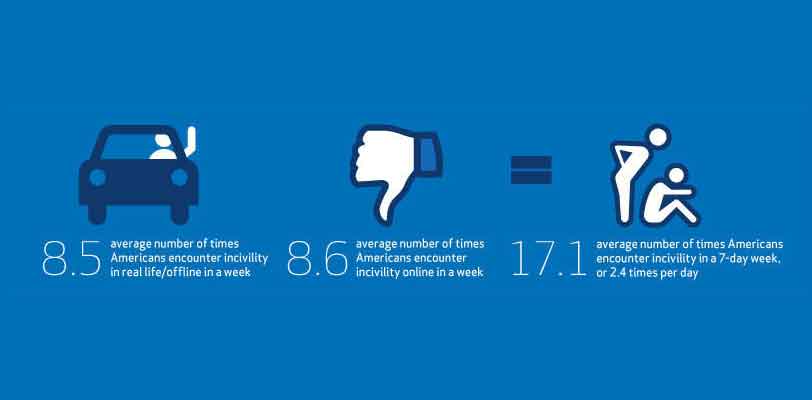Pick a day. Any day. During that day Americans expect to encounter 2.4 acts of incivility from another person.
Rudeness is another term for the behavior.
That statistic is based on research released by global public relations firm Weber Shandwick and public affairs firm Powell Tate in partnership with KRC Research.
Civility in America continues to disintegrate and rude behavior is becoming the "new normal," the survey said.
Reports of personal infringements are on the rise, driving 70 percent of Americans to believe that incivility has reached crisis proportions. With Americans encountering incivility more than twice a day, on average, and 43 percent expecting to experience incivility in the next 24 hours, dealing with incivility has become a way of life for many.
"Incivility is turning into a national epidemic and becoming the new normal in behavior" said Pam Jenkins with Powell Tate. "With seven in ten citizens saying that incivility has reached crisis proportions, we need new solutions and greater leadership to reduce this discord in our daily lives."
Politicians, America's youth, the media and the Internet are assigned most responsibility for the problem.
While the public continues to cite politicians as the leading source of our nation's civility problems, the study shows that incivility goes well beyond political rancor, touching every aspect of American society.
The personal impact of incivility is felt across society and comes from many directions. Moreover, many Americans believe that uncivil words are provoking harmful deeds: 81 percent of Americans believe that uncivil behavior is leading to an increase in violence in our society.
Internet and social media among the leading causes of incivility
For the first time since tracking began in 2010, the Internet/social media has risen into the top ranks of perceived causes of incivility. A large portion of people surveyed -- 70 percent -- continue to believe that the Internet encourages uncivil behavior.
The study reveals a strong perception in reality:
- Online incivility is reportedly happening nearly nine times in an average week.
- Being a victim of cyberbullying has increased nearly three times between 2011 and 2013 (9 percent to 24 percent).
- Parents are significantly more likely this year than last to say that their children have experienced cyberbullying (25 percent vs. 17 percent) with threefold growth from 2011 (8 percent).
Americans respond to online incivility in a variety of ways. Nearly half of Americans (48 percent) have defriended, blocked or hidden someone online; roughly four in 10 (39 percent) have flagged or reported a comment or post as inappropriate or stopped going to an online site because it made them uncomfortable (36 percent). Another one-third (33 percent) opted out of an online discussion altogether.
